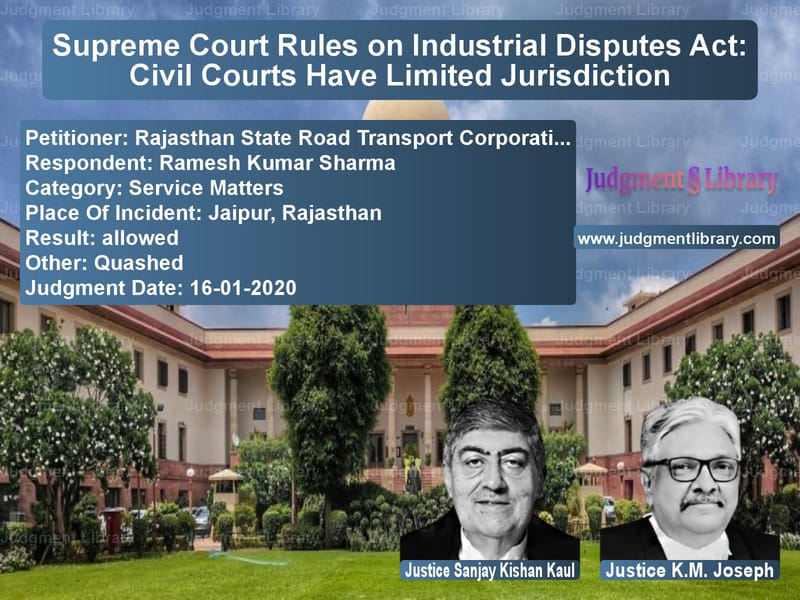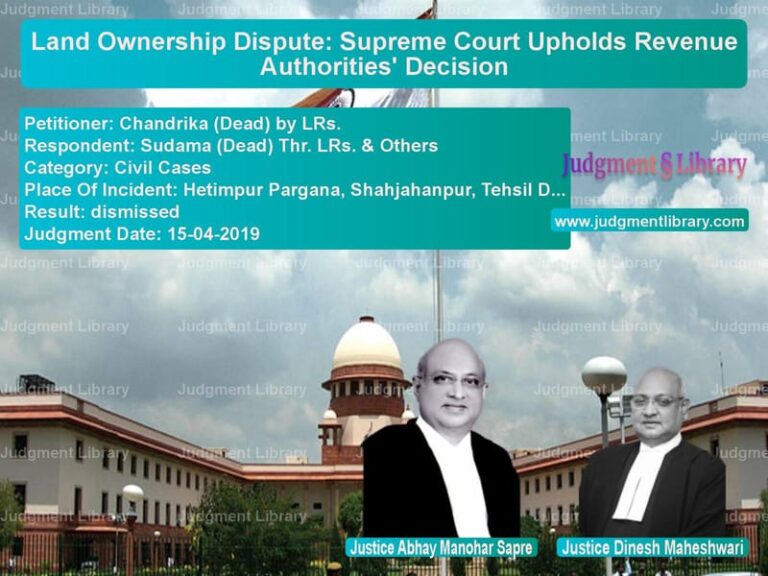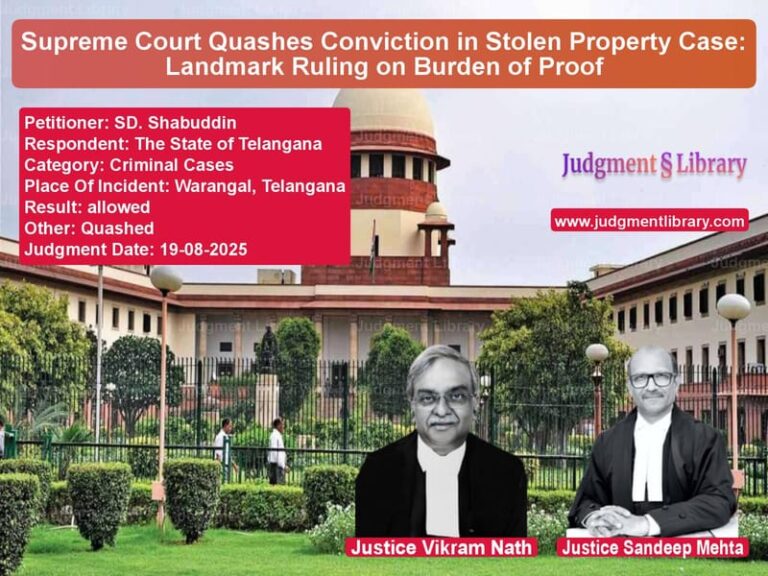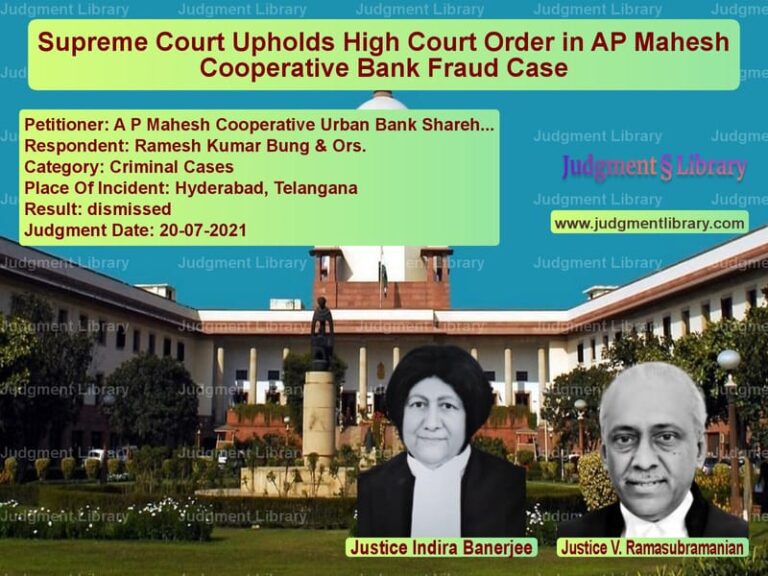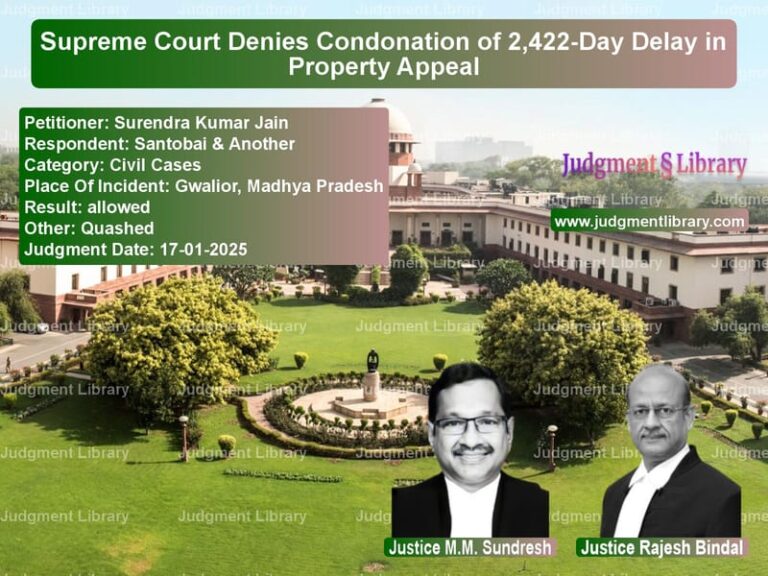Supreme Court Rules on Industrial Disputes Act: Civil Courts Have Limited Jurisdiction
The case of Rajasthan State Road Transport Corporation & Anr. vs. Ramesh Kumar Sharma is a significant ruling that clarifies the jurisdiction of civil courts in matters related to industrial disputes. The Supreme Court ruled that workmen must seek remedies under the Industrial Disputes Act, 1947, rather than approaching civil courts for enforcement of employment-related rights.
Background of the Case
- The respondent, Ramesh Kumar Sharma, was an employee of Rajasthan State Road Transport Corporation (RSRTC).
- RSRTC imposed a monetary fine on several employees for alleged violations of service conditions.
- The affected workmen filed a civil suit challenging the imposition of fines and sought a declaration and permanent injunction.
- The RSRTC filed an application under Order VII Rule 11 of the Code of Civil Procedure, 1908, arguing that the suit should be dismissed as the matter fell under the Industrial Disputes Act, 1947.
- The Civil Judge, Jaipur, rejected RSRTC’s plea, allowing the suit to proceed.
- The High Court of Rajasthan dismissed RSRTC’s revision petition against this order.
- The RSRTC then approached the Supreme Court, challenging the jurisdiction of civil courts in such disputes.
Legal Issues Considered
- Whether the Industrial Disputes Act, 1947 provides an exclusive remedy for workmen, thereby barring civil court jurisdiction.
- Whether the civil suit filed by the workmen was maintainable under general contract law.
- Whether a workman has the right to choose between a civil court and the labor tribunal for employment-related disputes.
- Whether the fines imposed by RSRTC violated the Standing Orders governing the employment of workmen.
Arguments of the Petitioner (RSRTC)
- The RSRTC argued that disputes concerning service conditions of workmen fall exclusively within the jurisdiction of labor tribunals under the Industrial Disputes Act, 1947.
- The Standing Orders governing employment matters were recognized under the Industrial Employment (Standing Orders) Act, 1946, which meant they were enforceable only through labor courts.
- The civil courts had no authority to adjudicate industrial disputes related to service conditions, penalties, or employment benefits.
- Allowing such cases in civil courts would lead to conflicting rulings and delay in dispute resolution.
Arguments of the Respondent (Ramesh Kumar Sharma & Other Workmen)
- The workmen contended that they had a contractual right to challenge the fine imposed on them.
- They argued that their suit was based on breach of contract and violation of their employment terms.
- The Industrial Disputes Act does not completely oust the jurisdiction of civil courts, especially where rights are derived from general contract law.
- The relief sought was declaratory in nature, which falls under the jurisdiction of civil courts.
Supreme Court’s Observations
- The Court reaffirmed that the Industrial Disputes Act, 1947 provides a comprehensive framework for resolving labor disputes.
- It emphasized that the Act was designed to offer a speedy, inexpensive, and specialized dispute resolution mechanism for workmen.
- The Court observed that civil courts have jurisdiction only in cases where the dispute does not involve rights or obligations created by the Industrial Disputes Act.
- The Court relied on the Premier Automobiles Ltd. vs. Kamlekar Shantaram Wadke case, which held that wherever the Industrial Disputes Act applies, civil courts have no jurisdiction.
- The judgment cited Rajasthan State Road Transport Corporation & Anr. vs. Krishna Kant, which clarified that claims related to employment rights under labor laws must be pursued through labor tribunals.
- The Court stated: “The policy of the Industrial Disputes Act is to provide an alternative dispute resolution mechanism, which is exclusive and effective.”
Final Judgment
The Supreme Court ruled as follows:
- The civil suit filed by the workmen was not maintainable as the dispute fell within the jurisdiction of the Industrial Disputes Act, 1947.
- The High Court’s order rejecting RSRTC’s plea was set aside.
- The workmen were directed to pursue their claims through labor tribunals.
- The case serves as a precedent that civil courts cannot entertain disputes that fall under the purview of labor laws.
This ruling reinforces the principle that workmen must seek remedies within the framework of labor laws rather than approaching civil courts, ensuring that industrial disputes are resolved in an efficient manner.
Petitioner Name: Rajasthan State Road Transport Corporation & Anr..Respondent Name: Ramesh Kumar Sharma.Judgment By: Justice Sanjay Kishan Kaul, Justice K.M. Joseph.Place Of Incident: Jaipur, Rajasthan.Judgment Date: 16-01-2020.
Don’t miss out on the full details! Download the complete judgment in PDF format below and gain valuable insights instantly!
Download Judgment: Rajasthan State Road vs Ramesh Kumar Sharma Supreme Court of India Judgment Dated 16-01-2020.pdf
Direct Downlaod Judgment: Direct downlaod this Judgment
See all petitions in Employment Disputes
See all petitions in Public Sector Employees
See all petitions in Disciplinary Proceedings
See all petitions in Judgment by Sanjay Kishan Kaul
See all petitions in Judgment by K.M. Joseph
See all petitions in allowed
See all petitions in Quashed
See all petitions in supreme court of India judgments January 2020
See all petitions in 2020 judgments
See all posts in Service Matters Category
See all allowed petitions in Service Matters Category
See all Dismissed petitions in Service Matters Category
See all partially allowed petitions in Service Matters Category

